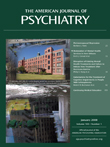To The Editor: Drs. Vinkers and van der Mast provide a useful context in which to consider our respective investigative efforts. They cite work reporting temporal relationships between depression and subsequent cognitive function on the one hand and cognition and subsequent depressive symptoms on the other. However, these were analyzed separately, each focusing on uni directional associations. Testing reciprocal relationships requires the use of analytic methods (e.g., path analysis) to examine bi directional associations simultaneously, an approach that was a central component of our work to better model dynamic associations, with each predicting the other over time.
We respectfully disagree with the final paragraph of the letter by Drs. Vinkers and van der Mast. There is no validated consensus regarding a proper cut-off for executive dysfunction. More importantly, excluding such subjects would arbitrarily remove the very variability of interest in research seeking to understand the relationships between depression and cognition in a heterogeneous population. It is not surprising that the cross-sectional associations between depression and executive function were stronger than the longitudinal associations, but this does not invalidate the latter, especially since we also covaried baseline cognition.
Still, how might we understand the disparities in our results? Dr. Vinkers et al.
(1) and Dr. Chen et al.
(2) both used community samples, the former studying a cohort of 85-year-old patients, while we focused on primary care patients age ≥65 years. The associations of interest may differ in surviving “old-old” patients compared with “young-old” participants or in primary care versus community-based samples. Both prior studies assessed self-reported depressive symptoms, while we employed the examiner-rated Hamilton Depression Rating Scale for depressive symptoms and the Structured Clinical Interview for DSM-IV to determine depressive diagnoses. The studies also used disparate cognitive domains or categorical dementia diagnosis as predictor and outcome variables. Our data were based on 2-year (compared with their 4- or 8-year) follow-ups; we had previously noted that the results may play out differently over a longer time period. Last, Dr. Chen et al. found that the risk ratio for depression predicting subsequent onset of dementia was in fact >1, albeit with a wide confidence interval that did not attain statistical significance. Considering this and other methodological issues, they commented that their findings did “not necessarily refute previous findings that major depression may be a risk factor” for dementia.
Taking together these and other prior studies, we conclude that the relationships between depression and cognition are far more complex than we might wish. Therefore, there is much more work to be done!

